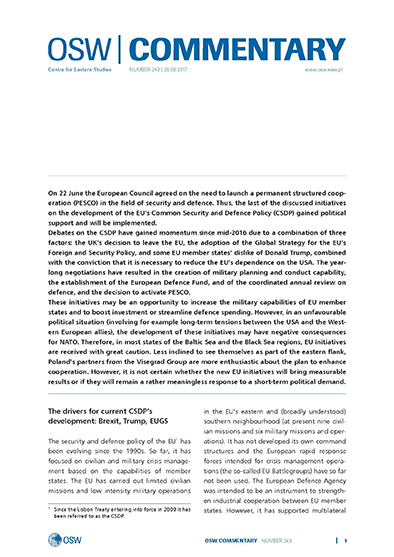The fiscal compact – Europe’s ‘hard core’ based on German economic conditions
The fiscal compact – Europe’s ‘hard core’ based on German economic conditions
Author(s): Konrad Popławski
Subject(s): Economic policy, International relations/trade, EU-Approach / EU-Accession / EU-Development
Published by: OSW Ośrodek Studiów Wschodnich im. Marka Karpia
Keywords: fiscal compact; European Union; Germany
Summary/Abstract: On 2 March, the leaders of 25 EU member states signed the Treaty on stability, coordination and governance in the economic and monetary union. It will introduce new fiscal constraints and officially vest new competences in the eurozone countries.Thus, their right to coordinate economic policy among them will be sanctioned. So far, the Lisbon Treaty has only provided for organisation of informal Eurogroup meetings, to be attended by representatives of the European Commission. The principles introduced by the compact, if the eurozone countries are really determined to observe its provisions, will create a new way of managing the single currency. Within the next few years, the most indebted countries will have to carry out radical reforms to boost their competitiveness and adjust it to German standards. During this period the Federal Republic of Germany will most probably decide to offer higher loan guarantees to relieve these countries’ budgets. The compact’s political consequences are also of great significance, especially considering how the treaty was finalised. The eurozone states have in fact accepted that the direction for changes will be devised by France and Germany, and the role of European institutions such as the Commission or the Parliament may weaken. From the perspective of eurozone candidate countries, the introduction of the fiscal compact means expanding the scope of conditions they must meet to become members of the single currency area. In the future, a country, in order to adopt the single currency, will have to meet the structural deficit criterion, and also most probably carry out economic reforms such as unifying its fiscal system. These goals will be achieved across the eurozone gradually, in the subsequent stages of the economic governance reform.
Series: OSW Commentary
- Page Count: 7
- Publication Year: 2012
- Language: English
- Content File-PDF

